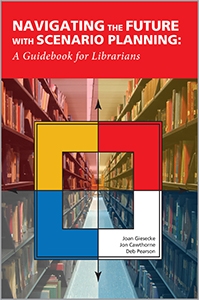Primary tabs
You don't need to be an ALA Member to purchase from the ALA Store, but you'll be asked to create an online account/profile during the checkout to proceed. This Web Account is for both Members and non-Members.
If you are Tax-Exempt, please verify that your account is currently set up as exempt before placing your order, as our new fulfillment center will need current documentation. Learn how to verify here.
- Description
- Table of Contents
- About the authors
- Reviews
This volume introduces and describes the use of scenario planning in libraries. Scenario planning can be used to build plausible stories about the future and to, therefore, be better able to plan, lead, and manage during uncertain times. This guidebook explains the uses of and processes for conducting scenario planning as both a futuring technique and as a planning tool. Combining practical step by step chapters with chapters on research using scenarios, Navigating the Future with Scenario Planning explains how libraries can use scenario planning tools to develop strategic agendas to help libraries to survive and thrive in turbulent times.
noted scenario planning expert Joan Giesecke with Jon E. Cawthorne and Debra Pearson and with contributions from Tyler Walters, this volume is appropriate for all types of academic libraries. Other types of libraries may also find this volume useful.
PART I [THE SCENARIO PLANNING PROCESS]
Chapter 1. Introduction
Joan Giesecke and Jon E. Cawthorne
A Theory of Scenario Planning
Scenario Planning versus Strategic Planning
A History of Scenario Planning
Scenarios and Scenario Planning
Navigating the Book
Notes
Chapter 2. Scenario Planning Theories
Joan Giesecke and Deb Pearson
Scenario Planning Models
- Schwartz
- Schoemaker
- Ralston and Wilson
- Lindgren and Bandhold
- Wade
- Mercer
- Chermack
Designing the Scenario Planning Process
- Organizational Readiness
- Identifying the Focal Issue or Question
Identifying the Steps in the Scenario Planning Process
Choosing the Scenario Planning Team
Beginning Scenario Planning
Ranking the Forces and Choosing the Driving Forces
Developing the Scenarios
Determining the Implications of the Scenarios
A Brief Example of Scenario Development
Conclusion
Notes
Chapter 3. Writing Scenario Plots
Joan Giesecke and Deb Pearson
Scenario Styles
Major Plot Lines
- Winners and Losers
- Challenge and Response
- Evolution
Other Plot Ideas
- Revolution
- Cycles
- Infinite Possibilities
- Lone Ranger
Writing the Story
Conclusion
Notes
Chapter 4. Developing Strategies for Scenarios
Joan Giesecke and Deb Pearson
Developing Strategies
Displaying Strategies
Conclusion
Notes
PART 2 [ESSAYS AND CASE STUDIES]
Chapter 5. Using Complementary Research Methods to Enhance Scenario Planning
Tyler Walters
Introduction
Scenario Planning versus Using Scenarios
Research Methods
- Delphi Method
- Semi-structured Interview Method
- Case Study Method
- Semi-structured Interview Method in Case Study Construction
- Stratified and Purposive Sampling
Conclusion
Notes
Chapter 6. Scenarios on Higher Education
Tyler Walters
International Higher Education Scenarios and Research Programs
International Scenario Drivers
North American Scenario Studies of Higher Education
International Scenario Studies of University Research Trends
University Library–Related Scenario Studies
Tips for Using Higher Education Scenarios
Notes
Chapter 7. How Scenarios Help Organizational Leaders Think Creatively about Change
Jon E. Cawthorne
Defining Culture and Development of Groups
Leadership for Change
Conclusion
Notes
Chapter 8. Scenarios for Planning with Human Resource Directors
Jon E. Cawthorne
The Importance of Human Resource Directors
Four Scenarios
The Case Study Institutions and Choice of Scenarios
Human Resource Directors in the Four Case Studies
- Case A
- Case B
- Case C
- Case D
Responses by the Human Resources Directors
- Similarities across All Case Study Sites
- Differences across Case Study Sites
Conclusion
Notes
Chapter 9. University of Nebraska–Lincoln Student Technology Fee Case Study Updated
Joan Giesecke and Deb Pearson
Student Technology Fee: A Case Study at the University of Nebraska–Lincoln
- Background
- Process
- Identifying the Drivers for Change
- Linking the Key Factors
- Producing the Initial Mini-scenario Elements
- Reducing the Number of Scenarios to Two
- Writing the Scenarios
- Identifying Issues That Arise
The Case Study Revisited
Lessons Learned
Conclusion
Notes
Bibliography
Joan Giesecke
Joan Giesecke (1951-2017) spent 25 years with the University of Nebraska–Lincoln libraries, including 16 as dean. During her tenure, Giesecke tripled the library's endowment, oversaw renovations to enhance the libraries in size and service, developed relationships to help colleges advance teaching and research, and enhanced the diversity of the libraries. She developed a training program for managers and presented a variety of papers on management and supervisory skills. She was a former editor of Library Administration and Management and published numerous articles on management issues.
Jon E. Cawthorne
Jon E. Cawthorne, PhD, has served as library dean at Wayne State University Library System, which includes the University’s School of Information Sciences and West Virginia University. He has a PhD in managerial leadership in the information professions from Simmons University and is passionate about inspiring the next generation of leaders, supporting healthy organizational cultures, building leadership capacity within non-profit boards, and increasing diverse representation and voices across the information and publishing industries. Cawthorne is a past president of the Association of College and Research Libraries and currently serves as the vice-chair for the Wiki Education Board and chair of the Lived Places Publishing Advisory Board.
Deb Pearson
Deb Pearson is Head, Libraries Facilities and Planning at the University of Nebraska-Lincoln.
"Very enlightening and engaging."
— College & Research Libraries



